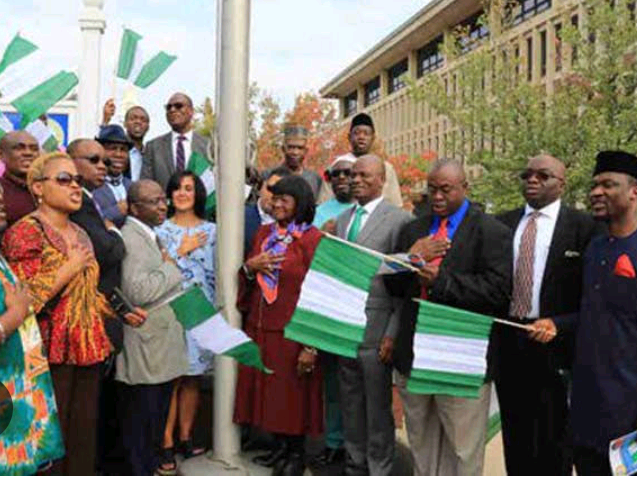The term ‘diaspora’ (Greek: to scatter) is broadly used to describe citizens of a nation by birth, but living outside its borders. That is, those individuals who live outside the geographical boundaries of their original homelands, but still identify with their land of origin. The Nigerian diaspora is one such case, of which we are concerned right here and now.
There is a kind of emotional attachment that also comes with this identification. Depending on the situation, the diaspora community would be interested in improving the conditions of their homeland. This is in the hope that they can return to their country someday, and meet it in a good state.
The Nigerian diaspora walk in the consciousness that their nation needs further development. On the other hand, they seek to identify with one another, concerned with each other’s welfare. It is on record that almost every nation on the Earth is inhabited by Nigerians. They go to other nations to seek opportunities such as better schooling, work, business, or to dwell in more favorable climes.
Nevertheless, the majority of them maintain close connections with their relatives and loved ones back home. Some of them even provide financial upkeep for family members for years following their traveling abroad. It is without doubt that the Nigerian diaspora constitute an enormous development resource to this nation, if they are taken seriously.
How Does the Nigerian Diaspora Contribute to National Development?
Political Influence and Activism
Members of the Nigerian diaspora have demonstrated support for political parties and democratic governance in so many ways. They have been observed to return in large numbers to physically participate in national elections. Some of them are financially capable of funding candidates and political parties, as well as civil societies.
Again, the diaspora community often go on publicized mass protests to draw attention to challenges at the homefront. Or otherwise demand for better treatment for fellow diasporans in foreign nations where they are domiciled. Their capacity to also advocate for policies that can favor their homeland in foreign nations has been demonstrated over the years.
Access to Cash Flow
Much of the time, the Nigerian diaspora have continued to support family members and friends in cash and kind for months and years. They have thus helped to lift loved ones out of poverty and helplessness. Such loved ones are usually given enormous opportunities to set up businesses, build houses, and go to well-funded schools back home. Thus, they contribute to the socio-economic development of the country.
According to the Nigerians in Diaspora Commission (NIDCOM), 25 billion US Dollars in remittances by diasporans were added to the Nigerian economy in 2019. This constituted 6% of the Gross Domestic Product at that time. It was also discovered that In 2012, Nigerian diasporans contributed more to Nigeria’s economy than 34 of the 36 states. The total remittance from the Nigerian Diaspora amounted to $12 billion.
The diaspora community also facilitates the movement of other family members to their foreign base to experience a better livelihood over time.
Contributing to Charities and Social Groups
Oftentimes the Nigerian diaspora contribute financially and materially to the activities of non-governmental organizations, charities and associations. Thus, they help to reduce poverty and promote economic development in their local communities, and at the state or national levels. Their benefit is not just limited to their close relations alone.
Providing Advanced Knowledge and Expertise:
NIDCOM has also pointed out that the Nigerian diaspora comprises highly educated and skilled individuals. Some of them occupy key positions of influence and authority in multinational companies, industries and organizations. They bring their vast social networks and professional experience along with them to serve the nation and should therefore not be ignored.
Assistance During Emergency and Disaster Relief Operations:
The Nigerian diaspora are very active in providing financial support and relief materials during disaster relief operations. They have shown empathy and concern in several instances of emergency issues in the country in recent times.
Nigerian Diaspora: Government Moves to Sustain Relations with Them
The Nigerians in Diaspora Commission was formed through the Establishment Act of 2017. The primary motive for setting up NIDCOM was to:
“provide for the engagement of Nigerians in Diaspora in the policies, projects and participation in the development of Nigeria; and to utilize the human capital and material resources of Nigerians in Diaspora towards the overall socio-economic,
cultural and political development of Nigeria and for related matters.”
The National Diaspora Policy was therefore created to pursue the mandate above. The policy is intended to serve as a guide on how NIDCOM, its partners and stakeholders would engage Nigerians in diaspora. Such partners and stakeholders include:
- Ministries, Departments and Agencies (MDAs) of government, and
- Multinational organizations
By doing so, NIDCOM would strive to bring the Nigerian diaspora community closer home. Thus the Nigerian diaspora can contribute through quality participation in nation building and sustainable economic development.
